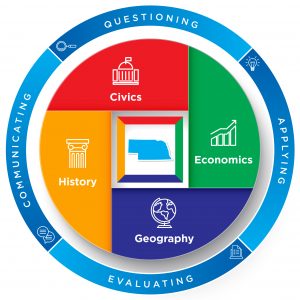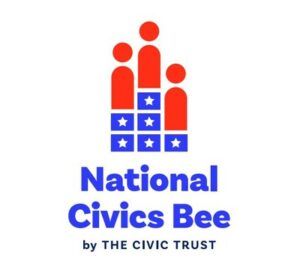Our Mission:
Nebraska’s social studies educators are committed to advocating for and providing a high-quality education that will enable all students to successfully understand and participate in the local, state, and national governing processes by using high quality instructional materials and methods most closely associated with:
- Civic Education – Students should be made fully aware of the liberties, opportunities, and advantages we possess and the sacrifices and struggles of those through whose efforts these benefits were gained in such a way that the youth of our state can become competent, responsible, patriotic, and civil American citizens.
- Multicultural Education – Includes, but is not limited to, studies relative to the culture, history, and contributions of African Americans, Hispanic Americans, Native Americans, and Asian Americans. Special emphasis shall be placed on human relations and sensitivity toward all races.
- Inquiry – A process for supporting students to ask questions about our social world, use concepts and tools from the disciplines, that make up social studies, analyze and argue about what they have learned, and apply that knowledge to the challenges that face our world today.
Our Vision:
To support all Nebraska students in achieving their goals in civic, college, and career life by instilling the necessary skills that will provide the courage to ask questions, deepen content understanding, evaluate the past to inform the present, identify issues and propose solutions, and be made fully aware of all rights and liberties.
Our Why:
As a core content, social studies fosters civic and political attitudes and behaviors that promote civil discourse, an engaged citizenry, and connectedness to local communities. Studies like the one released by the Thomas B. Fordham Institute in 2020 demonstrate that “increased instructional time in social studies is associated with improved reading ability” (Tyner & Kabourek, 2020). To that end, Nebraska social studies educators have a responsibility to ensure that our students graduate from high school “prepared for success in postsecondary education, career, and life pursuits” (AQuESTT).
News & Notes
National Civics Bee Coming to Nebraska in 2026!
In celebration of America’s 250th birthday, Nebraska is excited to host the National Civics Bee—a nationwide competition that empowers middle school students to engage in civics, strengthen their communities, and showcase their leadership.
Walk to Unlock Nebraska
A Virtual Learning & Physical Activity Challenge
Walk to Unlock Nebraska invites students and teachers to combine exercise and learning through a fun, competitive virtual platform that rewards physical activity with fascinating historical, geographical, and agriculture information about our state.
- This learning experience is targeted for students in kindergarten through eighth grade
- Multiple lesson topics include science, social studies, math, language arts, nutrition and more
- Integrated curricular ideas are included to be used as tools for learning both in the classroom and at home
- Virtual field trips are available to enhance the journey
Social Studies Standards
Nebraska Social Studies Standards – 2019
Adopted in November of 2019, the Nebraska Social Studies Standards describe the knowledge and skills that students should learn, but they do not prescribe particular curriculum, lessons, teaching
techniques, or activities. These standards create a framework for teaching and learning, and they articulate a trajectory for knowledge acquisition across all grade levels. This ensures that student learning builds on prior knowledge and becomes more in-depth over time. Standards describe what students are expected to know and be able to do, while the local curriculum and instructional materials are used to help students master the standards. Decisions about curriculum and instructional materials are made locally by individual school districts and classroom teachers. The Nebraska Department of Education does not mandate the curriculum or instructional materials used within a local school.







